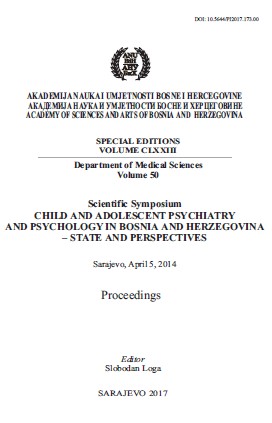NEGATIVE EMOTIONAL STATES AND QUALITY OF LIFE IN PARENTS OF CHILDREN WITH AUTSTIC SPECTRUM DISORDER
NEGATIVE EMOTIONAL STATES AND QUALITY OF LIFE IN PARENTS OF CHILDREN WITH AUTSTIC SPECTRUM DISORDER
Author(s): Mira Spremo, Tatjana Marković, Nada Vaselić, Slobodan Spremo
Subject(s): Developmental Psychology, Neuropsychology, Behaviorism, Health and medicine and law, Family and social welfare
Published by: Akademija Nauka i Umjetnosti Bosne i Hercegovine
Keywords: autistic spectrum disorder; parents; stress; anxiety; depression; quality of life;
Summary/Abstract: Prevalence of autistic spectrum disorders is constantly increasing. Considering the lack of institutionalized support for guardians, it has been noticed that parents of children with ASD more often experience negative emotional states, such as depression, anxiety and stress, and perceive their quality of life to be lower than the parents of typically developing children. The aim of our research was to compare the level of depression, anxiety, stress and quality of life in parents of children with ASD and parents of children without developmental difficulties. The research was quantitative, a socio-demographic questionnaire was used, as well as DASS-21 and WHOQOL scales. There were 78 participants, of which 39 parents of children with ASD (members of „Djeca svjetlosti“ Banja Luka and EDUS Sarajevo), and 39 parents of children without developmental difficulties. F-test was used for comparison of results in the depression, anxiety, stress and quality of life scales between the two groups. It was found that there were statistically significant differences in the level of depression (F=3.72, p<.01), anxiety (F=4.51, p<.01) and stress (F=3.47, p<.01), in a way that negative emotion levels were higher in parents of children with autistic spectrum disorder. As far as the perceived quality of life is concerned, the only statistically significant difference was found in the domain of psychological health (F=-3.22, p<.01), in the way that the parents of typically developing children had higher level of perceived satisfaction in this domain.
Book: Dječija I Adolescentna Psihijatrija I Psihologija U Bosni I Hercegovini – Stanje I Perspektive
- Page Range: 72-81
- Page Count: 10
- Publication Year: 2017
- Language: English
- Content File-PDF

